Nursing as Advocacy: Championing Primary Health Care Equity
VerifiedAdded on 2021/10/27
|6
|1132
|424
Essay
AI Summary
This essay examines the critical role of nursing as advocacy in promoting equity, efficacy, and accessibility to primary health care (PHC), particularly for patients from low-income regions, elderly patients, and disadvantaged individuals. It highlights the ethical responsibility of nurses to inform, empower, and promote patient decision-making. The essay addresses the challenges in accessing basic healthcare faced by low-income and elderly populations, including a lack of nursing professionals in low-income communities, insufficient healthcare facilities, and difficulties in transportation and health literacy. It suggests mobilizing nursing associations and localities through publicity initiatives and involving policymakers in awareness efforts to improve government commitment to health financing. The essay also acknowledges potential opposition arising from policy disagreements and a lack of political will and outlines the author's advocacy criteria, emphasizing the importance of promoting nursing professionalism, ethics, and collaborative efforts to address PHC issues.
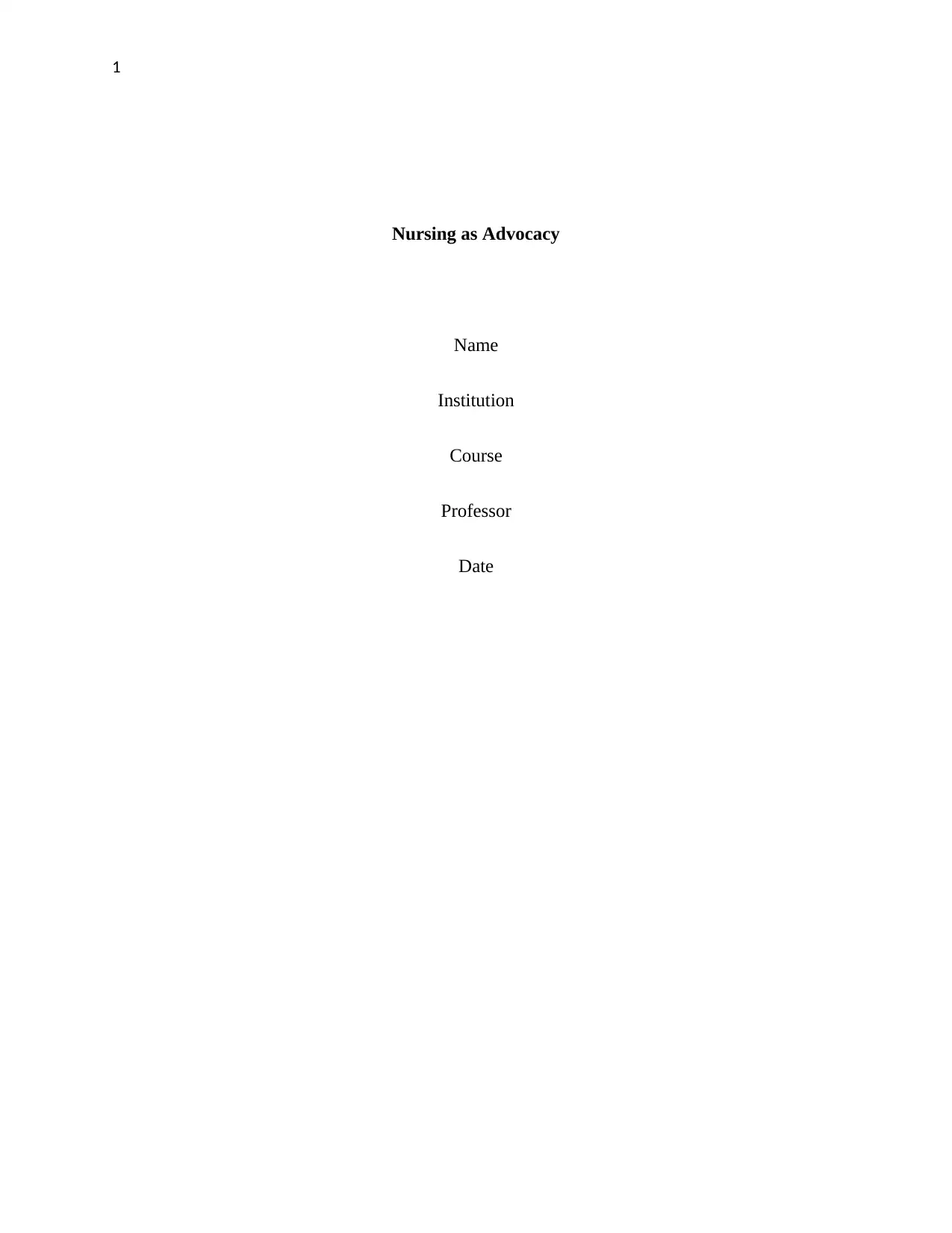
1
Nursing as Advocacy
Name
Institution
Course
Professor
Date
Nursing as Advocacy
Name
Institution
Course
Professor
Date
Paraphrase This Document
Need a fresh take? Get an instant paraphrase of this document with our AI Paraphraser
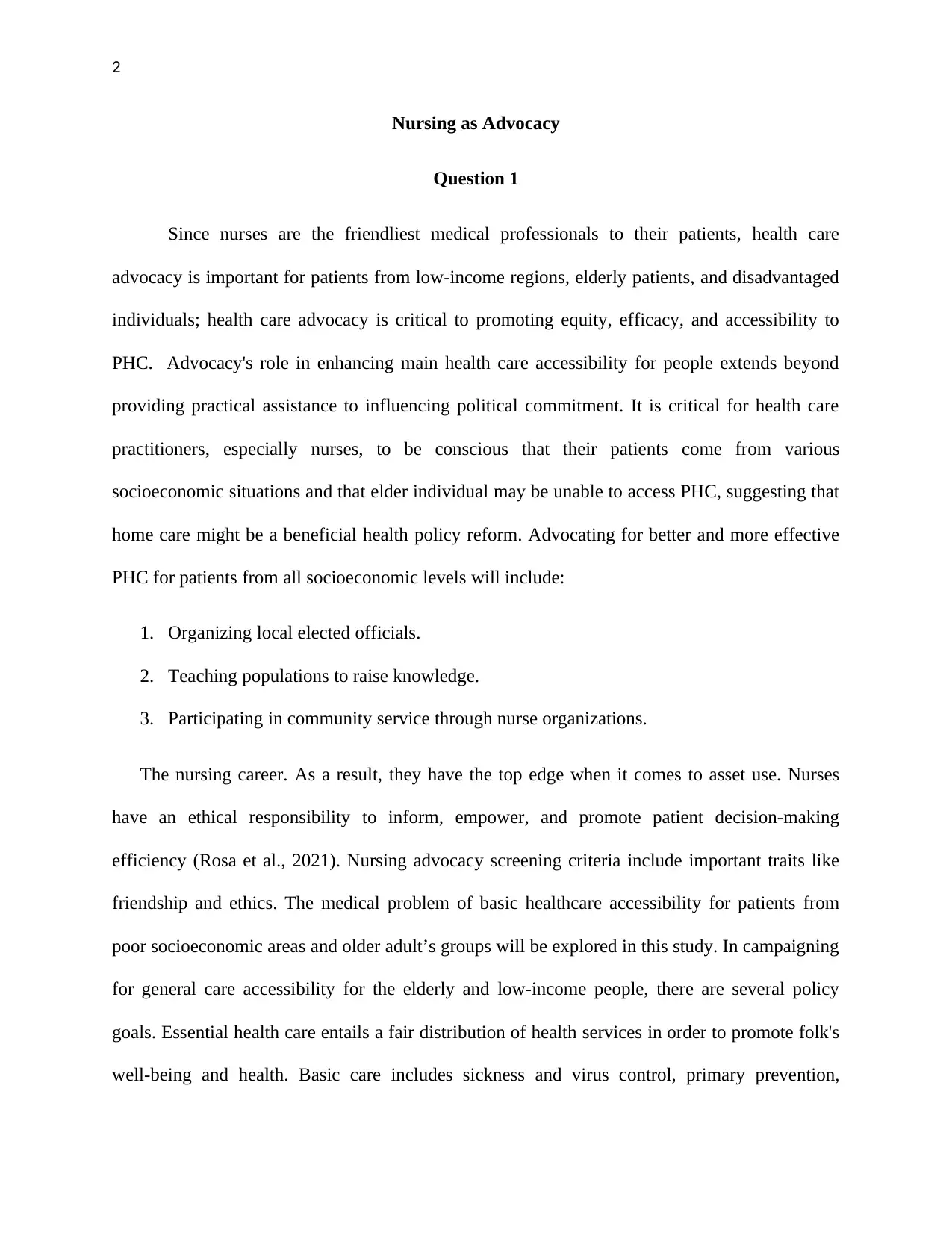
2
Nursing as Advocacy
Question 1
Since nurses are the friendliest medical professionals to their patients, health care
advocacy is important for patients from low-income regions, elderly patients, and disadvantaged
individuals; health care advocacy is critical to promoting equity, efficacy, and accessibility to
PHC. Advocacy's role in enhancing main health care accessibility for people extends beyond
providing practical assistance to influencing political commitment. It is critical for health care
practitioners, especially nurses, to be conscious that their patients come from various
socioeconomic situations and that elder individual may be unable to access PHC, suggesting that
home care might be a beneficial health policy reform. Advocating for better and more effective
PHC for patients from all socioeconomic levels will include:
1. Organizing local elected officials.
2. Teaching populations to raise knowledge.
3. Participating in community service through nurse organizations.
The nursing career. As a result, they have the top edge when it comes to asset use. Nurses
have an ethical responsibility to inform, empower, and promote patient decision-making
efficiency (Rosa et al., 2021). Nursing advocacy screening criteria include important traits like
friendship and ethics. The medical problem of basic healthcare accessibility for patients from
poor socioeconomic areas and older adult’s groups will be explored in this study. In campaigning
for general care accessibility for the elderly and low-income people, there are several policy
goals. Essential health care entails a fair distribution of health services in order to promote folk's
well-being and health. Basic care includes sickness and virus control, primary prevention,
Nursing as Advocacy
Question 1
Since nurses are the friendliest medical professionals to their patients, health care
advocacy is important for patients from low-income regions, elderly patients, and disadvantaged
individuals; health care advocacy is critical to promoting equity, efficacy, and accessibility to
PHC. Advocacy's role in enhancing main health care accessibility for people extends beyond
providing practical assistance to influencing political commitment. It is critical for health care
practitioners, especially nurses, to be conscious that their patients come from various
socioeconomic situations and that elder individual may be unable to access PHC, suggesting that
home care might be a beneficial health policy reform. Advocating for better and more effective
PHC for patients from all socioeconomic levels will include:
1. Organizing local elected officials.
2. Teaching populations to raise knowledge.
3. Participating in community service through nurse organizations.
The nursing career. As a result, they have the top edge when it comes to asset use. Nurses
have an ethical responsibility to inform, empower, and promote patient decision-making
efficiency (Rosa et al., 2021). Nursing advocacy screening criteria include important traits like
friendship and ethics. The medical problem of basic healthcare accessibility for patients from
poor socioeconomic areas and older adult’s groups will be explored in this study. In campaigning
for general care accessibility for the elderly and low-income people, there are several policy
goals. Essential health care entails a fair distribution of health services in order to promote folk's
well-being and health. Basic care includes sickness and virus control, primary prevention,
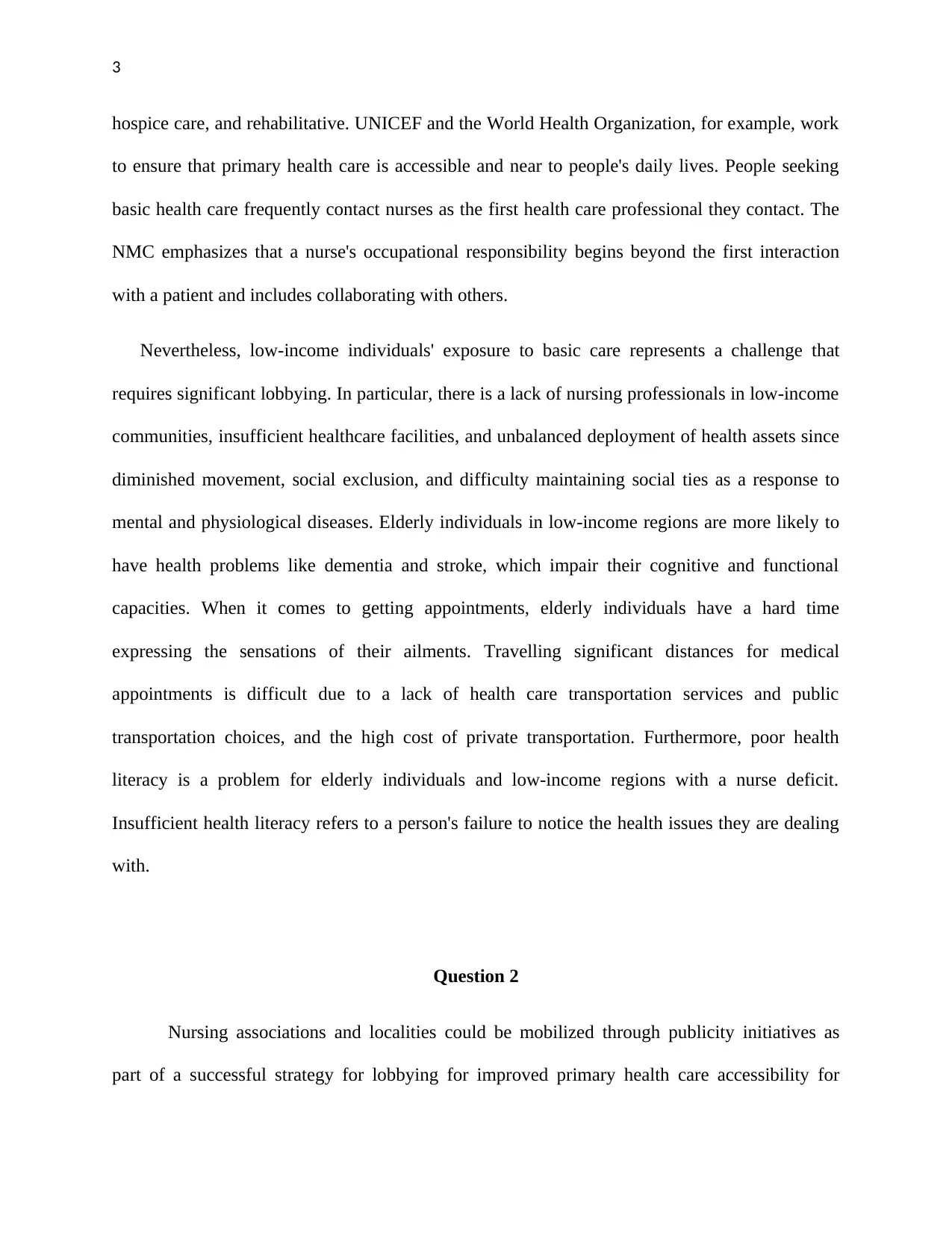
3
hospice care, and rehabilitative. UNICEF and the World Health Organization, for example, work
to ensure that primary health care is accessible and near to people's daily lives. People seeking
basic health care frequently contact nurses as the first health care professional they contact. The
NMC emphasizes that a nurse's occupational responsibility begins beyond the first interaction
with a patient and includes collaborating with others.
Nevertheless, low-income individuals' exposure to basic care represents a challenge that
requires significant lobbying. In particular, there is a lack of nursing professionals in low-income
communities, insufficient healthcare facilities, and unbalanced deployment of health assets since
diminished movement, social exclusion, and difficulty maintaining social ties as a response to
mental and physiological diseases. Elderly individuals in low-income regions are more likely to
have health problems like dementia and stroke, which impair their cognitive and functional
capacities. When it comes to getting appointments, elderly individuals have a hard time
expressing the sensations of their ailments. Travelling significant distances for medical
appointments is difficult due to a lack of health care transportation services and public
transportation choices, and the high cost of private transportation. Furthermore, poor health
literacy is a problem for elderly individuals and low-income regions with a nurse deficit.
Insufficient health literacy refers to a person's failure to notice the health issues they are dealing
with.
Question 2
Nursing associations and localities could be mobilized through publicity initiatives as
part of a successful strategy for lobbying for improved primary health care accessibility for
hospice care, and rehabilitative. UNICEF and the World Health Organization, for example, work
to ensure that primary health care is accessible and near to people's daily lives. People seeking
basic health care frequently contact nurses as the first health care professional they contact. The
NMC emphasizes that a nurse's occupational responsibility begins beyond the first interaction
with a patient and includes collaborating with others.
Nevertheless, low-income individuals' exposure to basic care represents a challenge that
requires significant lobbying. In particular, there is a lack of nursing professionals in low-income
communities, insufficient healthcare facilities, and unbalanced deployment of health assets since
diminished movement, social exclusion, and difficulty maintaining social ties as a response to
mental and physiological diseases. Elderly individuals in low-income regions are more likely to
have health problems like dementia and stroke, which impair their cognitive and functional
capacities. When it comes to getting appointments, elderly individuals have a hard time
expressing the sensations of their ailments. Travelling significant distances for medical
appointments is difficult due to a lack of health care transportation services and public
transportation choices, and the high cost of private transportation. Furthermore, poor health
literacy is a problem for elderly individuals and low-income regions with a nurse deficit.
Insufficient health literacy refers to a person's failure to notice the health issues they are dealing
with.
Question 2
Nursing associations and localities could be mobilized through publicity initiatives as
part of a successful strategy for lobbying for improved primary health care accessibility for
⊘ This is a preview!⊘
Do you want full access?
Subscribe today to unlock all pages.

Trusted by 1+ million students worldwide
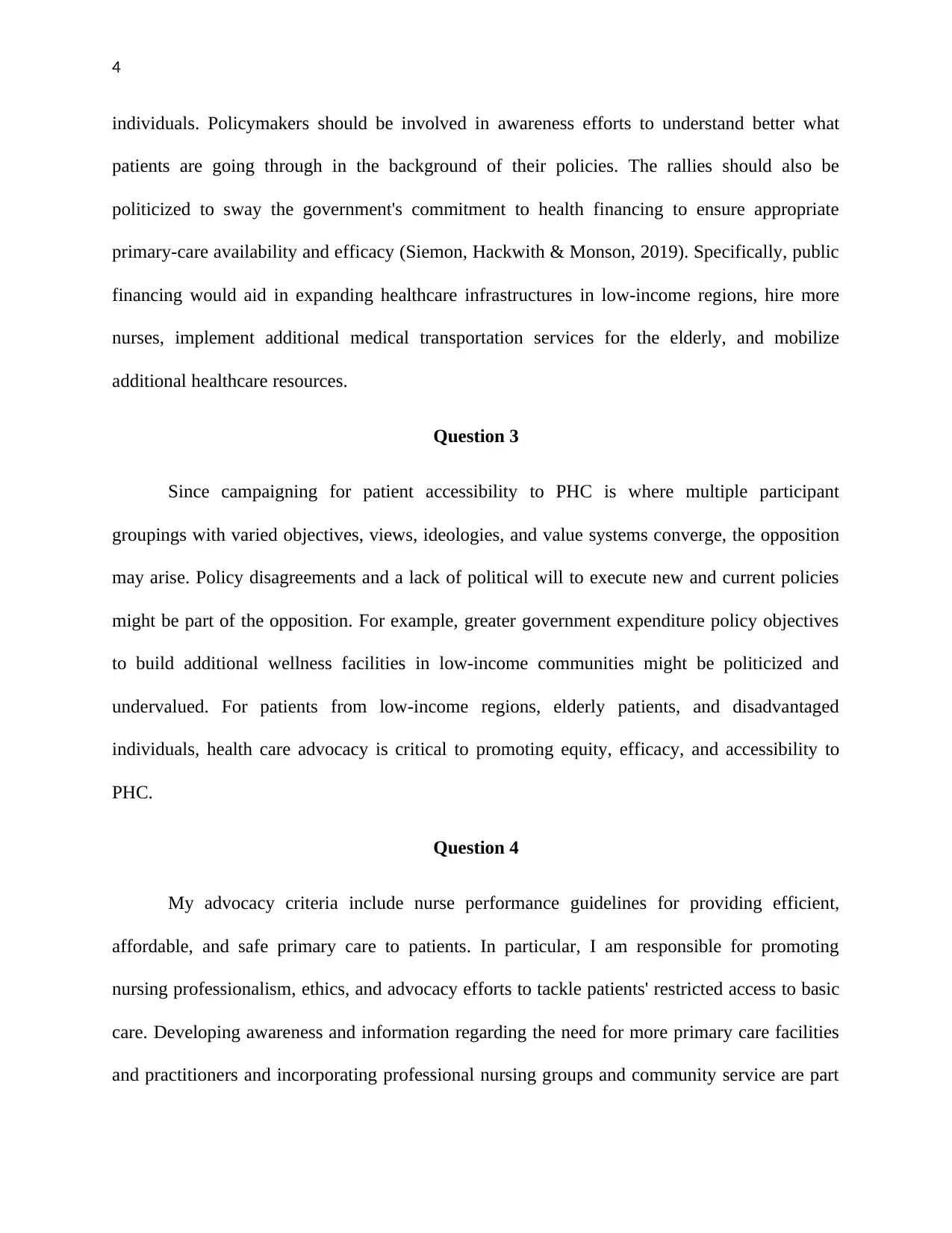
4
individuals. Policymakers should be involved in awareness efforts to understand better what
patients are going through in the background of their policies. The rallies should also be
politicized to sway the government's commitment to health financing to ensure appropriate
primary-care availability and efficacy (Siemon, Hackwith & Monson, 2019). Specifically, public
financing would aid in expanding healthcare infrastructures in low-income regions, hire more
nurses, implement additional medical transportation services for the elderly, and mobilize
additional healthcare resources.
Question 3
Since campaigning for patient accessibility to PHC is where multiple participant
groupings with varied objectives, views, ideologies, and value systems converge, the opposition
may arise. Policy disagreements and a lack of political will to execute new and current policies
might be part of the opposition. For example, greater government expenditure policy objectives
to build additional wellness facilities in low-income communities might be politicized and
undervalued. For patients from low-income regions, elderly patients, and disadvantaged
individuals, health care advocacy is critical to promoting equity, efficacy, and accessibility to
PHC.
Question 4
My advocacy criteria include nurse performance guidelines for providing efficient,
affordable, and safe primary care to patients. In particular, I am responsible for promoting
nursing professionalism, ethics, and advocacy efforts to tackle patients' restricted access to basic
care. Developing awareness and information regarding the need for more primary care facilities
and practitioners and incorporating professional nursing groups and community service are part
individuals. Policymakers should be involved in awareness efforts to understand better what
patients are going through in the background of their policies. The rallies should also be
politicized to sway the government's commitment to health financing to ensure appropriate
primary-care availability and efficacy (Siemon, Hackwith & Monson, 2019). Specifically, public
financing would aid in expanding healthcare infrastructures in low-income regions, hire more
nurses, implement additional medical transportation services for the elderly, and mobilize
additional healthcare resources.
Question 3
Since campaigning for patient accessibility to PHC is where multiple participant
groupings with varied objectives, views, ideologies, and value systems converge, the opposition
may arise. Policy disagreements and a lack of political will to execute new and current policies
might be part of the opposition. For example, greater government expenditure policy objectives
to build additional wellness facilities in low-income communities might be politicized and
undervalued. For patients from low-income regions, elderly patients, and disadvantaged
individuals, health care advocacy is critical to promoting equity, efficacy, and accessibility to
PHC.
Question 4
My advocacy criteria include nurse performance guidelines for providing efficient,
affordable, and safe primary care to patients. In particular, I am responsible for promoting
nursing professionalism, ethics, and advocacy efforts to tackle patients' restricted access to basic
care. Developing awareness and information regarding the need for more primary care facilities
and practitioners and incorporating professional nursing groups and community service are part
Paraphrase This Document
Need a fresh take? Get an instant paraphrase of this document with our AI Paraphraser
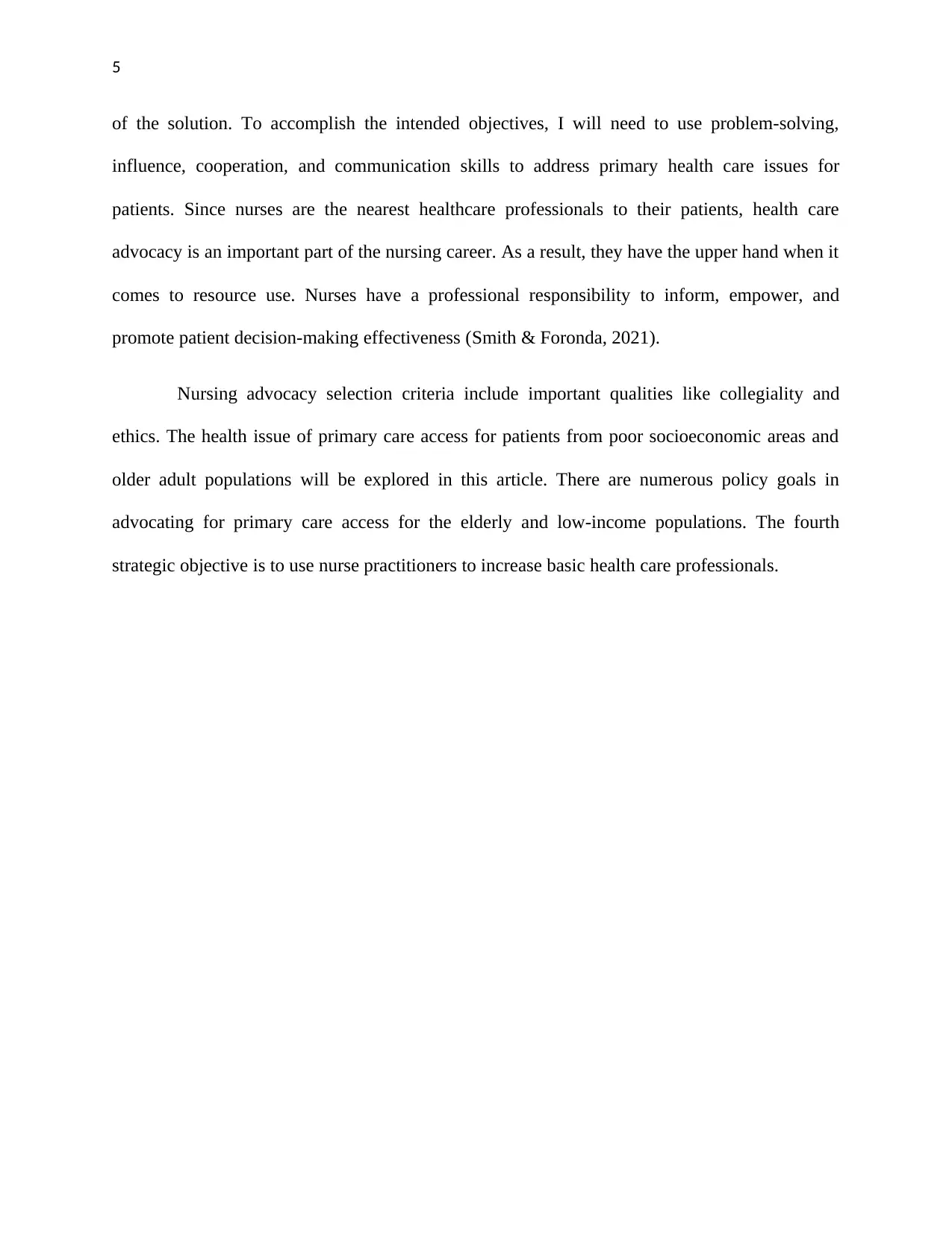
5
of the solution. To accomplish the intended objectives, I will need to use problem-solving,
influence, cooperation, and communication skills to address primary health care issues for
patients. Since nurses are the nearest healthcare professionals to their patients, health care
advocacy is an important part of the nursing career. As a result, they have the upper hand when it
comes to resource use. Nurses have a professional responsibility to inform, empower, and
promote patient decision-making effectiveness (Smith & Foronda, 2021).
Nursing advocacy selection criteria include important qualities like collegiality and
ethics. The health issue of primary care access for patients from poor socioeconomic areas and
older adult populations will be explored in this article. There are numerous policy goals in
advocating for primary care access for the elderly and low-income populations. The fourth
strategic objective is to use nurse practitioners to increase basic health care professionals.
of the solution. To accomplish the intended objectives, I will need to use problem-solving,
influence, cooperation, and communication skills to address primary health care issues for
patients. Since nurses are the nearest healthcare professionals to their patients, health care
advocacy is an important part of the nursing career. As a result, they have the upper hand when it
comes to resource use. Nurses have a professional responsibility to inform, empower, and
promote patient decision-making effectiveness (Smith & Foronda, 2021).
Nursing advocacy selection criteria include important qualities like collegiality and
ethics. The health issue of primary care access for patients from poor socioeconomic areas and
older adult populations will be explored in this article. There are numerous policy goals in
advocating for primary care access for the elderly and low-income populations. The fourth
strategic objective is to use nurse practitioners to increase basic health care professionals.
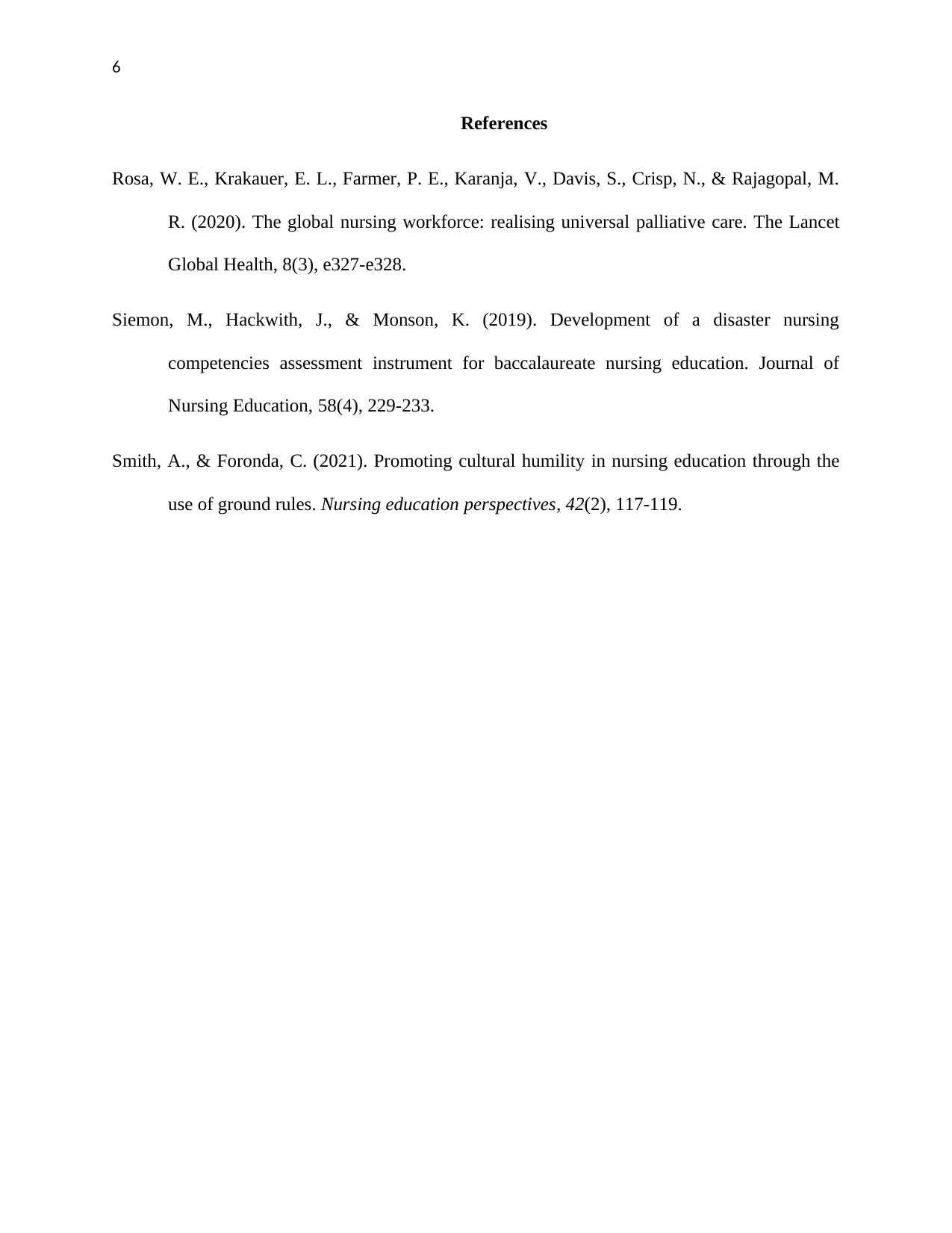
6
References
Rosa, W. E., Krakauer, E. L., Farmer, P. E., Karanja, V., Davis, S., Crisp, N., & Rajagopal, M.
R. (2020). The global nursing workforce: realising universal palliative care. The Lancet
Global Health, 8(3), e327-e328.
Siemon, M., Hackwith, J., & Monson, K. (2019). Development of a disaster nursing
competencies assessment instrument for baccalaureate nursing education. Journal of
Nursing Education, 58(4), 229-233.
Smith, A., & Foronda, C. (2021). Promoting cultural humility in nursing education through the
use of ground rules. Nursing education perspectives, 42(2), 117-119.
References
Rosa, W. E., Krakauer, E. L., Farmer, P. E., Karanja, V., Davis, S., Crisp, N., & Rajagopal, M.
R. (2020). The global nursing workforce: realising universal palliative care. The Lancet
Global Health, 8(3), e327-e328.
Siemon, M., Hackwith, J., & Monson, K. (2019). Development of a disaster nursing
competencies assessment instrument for baccalaureate nursing education. Journal of
Nursing Education, 58(4), 229-233.
Smith, A., & Foronda, C. (2021). Promoting cultural humility in nursing education through the
use of ground rules. Nursing education perspectives, 42(2), 117-119.
⊘ This is a preview!⊘
Do you want full access?
Subscribe today to unlock all pages.

Trusted by 1+ million students worldwide
1 out of 6
Related Documents
Your All-in-One AI-Powered Toolkit for Academic Success.
+13062052269
info@desklib.com
Available 24*7 on WhatsApp / Email
![[object Object]](/_next/static/media/star-bottom.7253800d.svg)
Unlock your academic potential
Copyright © 2020–2026 A2Z Services. All Rights Reserved. Developed and managed by ZUCOL.





